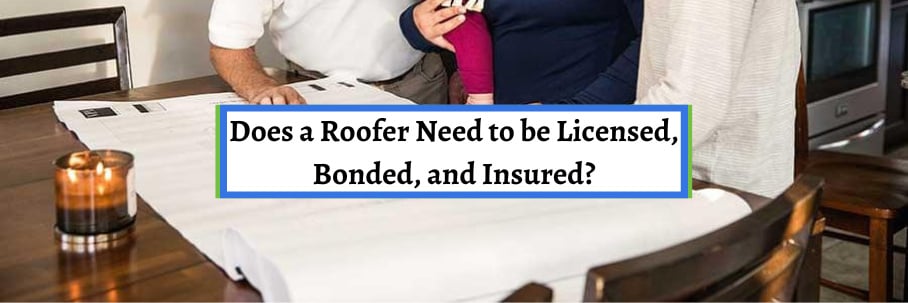Does a Roofer Need to be Licensed, Bonded, and Insured?

A new roof is a large investment that’s expected to offer decades of protection and peace of mind. Unfortunately, this protection can be ripped away by simply hiring the wrong roofing contractor.
That’s why you should look for one that’s licensed, bonded, and insured to prove the roofer does things the right way. Now, every state has different requirements, so one or all three might not be technically required to work in your area.
But if they’re not required, should a roofer still be licensed, bonded, and insured?
For over 30 years, the team at Bill Ragan Roofing has helped homeowners avoid falling victim to bad hiring decisions. That’s why I’ll break down what you need to know about a roofing contractor being licensed, bonded, and insured.
This article answers the following questions:
- Does a roofer need to be licensed, bonded, and insured?
- What does it mean to be licensed, bonded, and insured?
- Does a roofer really need to have all three pieces of paperwork?
Does a roofer need to be licensed, bonded, and insured?
Yes, every roofing contractor should be licensed, bonded, and insured in their state. These three pieces of paper protect you and ensure the roofing project is done right.
That’s why you shouldn’t be afraid to ask for proof of physical copies of all three from any potential roofing contractor. They’ll have no problem showing proof if they’re a reputable company.
Just know that each state has specific and different requirements for each. You could even be in a state where they don’t technically need to have one or the other.
That’s why you must research your state’s requirements to ensure the roofing contractor you hire has all appropriate permits and paperwork. However, I always recommend looking for a roofer with all three to truly protect you and your investment.
What does it mean to be licensed, bonded, and insured?
Now you know that a reputable roofer will be licensed, bonded, and insured. But what do these three pieces of paperwork mean, and why does a roofing contractor need them?
Licensed
A license proves the recipient has passed the exams and has the appropriate qualifications to work in your area. For a contractor to get a license, all they have to do is register with your state’s board of licensing contractors.
However, the price of the project determines the specific license needed. For example, a job over $3,000 requires a home improvement license, and anything over $25,000 requires a general contractor’s license.
Because a new roof is a large investment, most roofing contractors have a general contractor’s license. This simply ensures there are no hold-ups or delays on larger roofing projects that cost significantly more than $25,000.
Bonded
Bonds are in place to assure customers that they stand behind their promises. A bond ensures the service will be completed if the roofer goes out of business during the project or if there's a problem with the work they aren’t willing to fix.
You can look at being bonded as a sign that the roofing contractor does business correctly and ethically. This is because the bonding company knows the contractor will do the job the right way.
Unfortunately, that doesn’t mean you won’t run into a situation where you have to fall back on the bond. If this happens, the bonding company pays to get your roof taken care of, and then they’ll go after the contractor for the money.
Insured
All contractors should be fully insured with general liability, workman's comp, and a company vehicle insurance policy on all vehicles, owned and unowned. There’s no question that every roofer should have the appropriate insurance policies, but general liability and workman’s comp is where it varies.
General liability insurance and workman’s comp limits depend on the size of the contractor’s jobs and the state they work in. This matters because it impacts the overhead cost factor for a roofing project.
For a roofer doing small residential work, their general liability premiums will be less than a company that does larger jobs. This plays a role in why some bigger roofing companies have higher prices than smaller companies.
Does a roofer really need to have all three pieces of paperwork?
At this point, you hopefully understand the importance of a roofer being licensed, bonded, and insured. But as I said, your specific state determines if one, two, or all three are required.
So, you may be thinking you can hire a roofer without them because your state says they don’t have to be. However, it’s a huge red flag if a roofer isn't licensed, bonded, and insured.
A roofing contractor having all three pieces of paperwork protects you and the hard-earned money you’re about to spend. Without them, you’ll literally have zero recourse if something goes wrong, someone gets hurt, or the business shuts down.
That’s why asking every potential roofer for proof they’re licensed, bonded, and insured is crucial. If they can’t prove they have all three or outright refuse, move on with your search.
What else do you need to look for in a roofing contractor?
Now you know it’s crucial to find a roofing contractor that’s licensed, bonded, and insured. Even if your state doesn’t require all three, you deserve to know your investment is protected.
So, don’t be afraid to be picky and find the roofing contractor you can trust to do things the right way. But hiring a company that’s licensed, bonded, and insured is just one thing you need to look for in a reputable roofer.
With the roofing industry’s reputation, you have to be confident you’re making the right choice. Unfortunately, this continues to get harder with all the roofing companies that pop up daily.
The last thing I want is for you to get taken advantage of by a smooth-talking salesman. That’s why I wrote another article that gives you the tips needed to hire a reputable roofing contractor in your area.
Check out 7 Tips to Find a Great Roofing Contractor to learn how to spot a reputable roofer out of the sea of options in your area.


